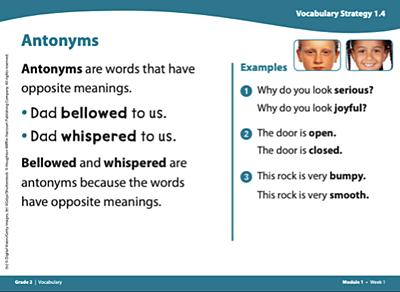Generative Vocabulary: Antonyms
Generative Vocabulary: Antonyms

Learning antonyms, words that have opposite meanings, for words you already know is a good way to expand your vocabulary.
Identifying antonyms while reading can be useful. Thinking of an antonym for a word you read and replacing it in the sentence to make the whole sentence mean the opposite thing is a good way to make sure you understand the word’s meaning.
Look at example 1.
- Why do you look serious?
Why do you look joyful?
If I were just learning the meaning of the word serious, I could replace it with the antonym joyful.
Then I’d ask myself: Does the sentence mean the opposite? If the answer is yes, I know that I understand the meaning of serious.
Let’s look at two more example of antonyms:
- It is warm today, but the weekend will be chilly.
- I can’t carry that heavy bag. Please give me one that is light.
For additional practice, you may complete Antonyms, page 12
Texas Tech K-12
-
Address
Texas Tech Plaza | 1901 University Ave, Lubbock, TX 79401 -
Phone
(800) 692-6877 -
Email
ttuk12@ttu.edu

